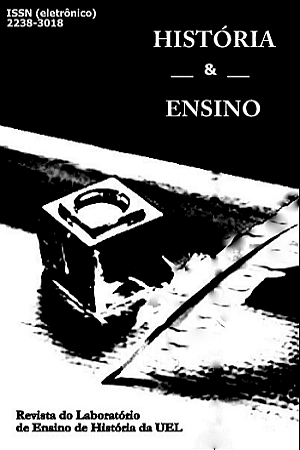Teacher's narratives on printed and virtual texts for the history teaching to earky grades of elementary school
DOI:
https://doi.org/10.5433/2238-3018.2018v24n2p197Keywords:
Teacher's Narratives, History Teaching, Historical learning, Early Grades.Abstract
The subject's cognitive movement for the narrative of his/her journey and project generates the construction of a 'self figure' where he/she introduces himself/herself as the subject of a History, of which they are authors and articulators of the present, past and future dimensions. Within this perspective, we opted for the biographical workshops of Delory- Momberger (2008) to produce a testimony document of 15 teachers from public Elementary Schools in Londrina. This intercultural communication exercise provided the recognition of the meaning attributed to virtual texts in their relationship with History Teaching texts, where we realized that books used to teach History, when transformed into electronic texts, are overestimated since it is not the support they give to the book (printed or electronic) that will generate better approaches and/or increase their potential to learn History in the Early Grades.
Downloads
References
BLANCH, Joan Pagès; FERNÁNDEZ, Antoni Santisteban. La ensenanza y el aprendizaje del tempo histórico em la educación primaria. Caderno CEDES, Campinas, n. 82, p. 281-309, set./dez. 2010.
BORGHI, Beatrice. Las fuentes de la historia entre investigación y didáctica. In: RUIZ, Rosa M. Ávila; GRACIA, M. Pilar Rivero; SANZ, Pedro L. Dominguez. Metodologia de investigación em didáctica de las ciencias sociales. Zaragoza: Institución Fernando El Católico (C.S.I.C), 2010. p.75- 84.
CHESNAUX, Jean. Modernidade-Mundo. 2.ed. Petrópolis: Vozes, 1996.
COOPER, Hilary. Didáctica de la historia em la educación infantil y primaria. Madrid: Ministério de Educación, Cultura Y Deporte; Ediciones Morata, 2002.
CERTEAU, Michel de. A escrita da história. 2. ed. Rio de Janeiro: Forense Universitária, 2007.
CHARTIER, Roger. A história ou a leitura do tempo. 2. ed. Belo Horizonte: Autêntica Editora, 2010.
CHARTIER, Roger. A aventura do livro: do leitor ao navegador. São Paulo: Imprensa Oficial do Estado de São Paulo: Editora UNESP, 1998.
COX, Kenia Kodel. Informática na educação escolar. 2. ed. Campinas: Autores Associados, 2008.
HABERMAS, Jürgen. Técnica e ciência como ideologia. Lisboa: Edições 70, 2011.
HOBSBAWM, Eric. O novo século. São Paulo: Companhia das Letras, 2000.
KOCKA, Jürgen. Historia social y conciencia historica. Madrid: Marcial Pons, Ediciones de Historia S.A, 2002
KOSELLECK, Reinhart. Los estratos del tempo: estudios sobre la historia. Barcelona: Ediciones Paidós Ibérica S. A., 2001.
KOSELLECK, Reinhart. Futuro passado: contribuição à semântica dos tempos históricos. Rio de Janeiro: Contraponto: Ed. PUC-Rio, 2006.
LAHIRE, Bernard. Homem plural: os determinantes da ação. Petrópolis: Editora Vozes, 2002. LE GOFF, Charles. História e memória. 5. ed. Campinas: Editora da UNICAMP, 2003.
MATTOZZI, Ivo. La investigación sobre didáctica de la Historia como diálogo entre investigación teórica e investigación aplicada. In: RUIZ, Rosa M. Ávila; GRACIA, M. Pilar Rivero; SANZ, Pedro L. Dominguez. Metodologia de investigación em didáctica de las ciencias sociales. Zaragoza: Institución Fernando El Católico (C.S.I.C), 2010. p.95-104.
RÃœSEN, Jörn. Razão histórica: teoria da história: os fundamentos da ciência histórica. Brasília: UNB, 2001.
RÃœSEN, Jörn. História viva: teoria da história III: formas e funções do conhecimento histórico. Brasília: UNB, 2007. RÃœSEN, Jörn. Jörn Rüsen e o ensino de história. Curitiba: Ed. UFPR, 2010.
RÃœSEN, Jörn. Aprendizagem histórica: fundamentos e paradigmas. Curitiba: W. A. Editores, 2012.
Downloads
Published
How to Cite
Issue
Section
License
Copyright (c) 2019 História & Ensino

This work is licensed under a Creative Commons Attribution 4.0 International License.
História & Ensino adota a licença CC-BY esta licença permite que os reutilizadores distribuam, remixem, adaptem e criem a partir do material em qualquer meio ou formato, desde que a atribuição seja dada ao criador. A licença permite o uso comercial.























